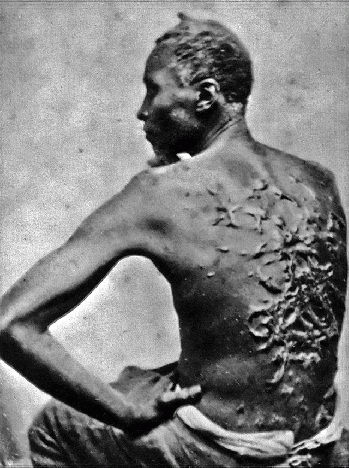This piece was reprinted by OpEdNews with permission or license. It may not be reproduced in any form without permission or license from the source.
Reprinted from Consortium News

A photograph showing the whipping scars on the back of an African-American slave.
(Image by (From Wikimedia) Unknown author, Author: Unknown author) Details Source DMCA
Better late than never, Jesuit-run Georgetown University has acknowledged that the school has "been able to hide from the truth" that it was built, literally, on the institution of slavery, according to its president John DiGioia.
Yet, decades ago, when a small group of us asked the Maryland Jesuits to confess openly to those crimes of their predecessors, we were rebuffed (apparently out of financial liability concerns). We saw the crucial role of slavery (and the sale of African-American slaves to help Georgetown meet its financial needs) as a moral issue. We also saw a scandal in the Jesuits' refusal to show moral leadership before they were finally forced to this year by a public shaming.
I dealt with the backstory of this sorry affair last spring when the "news" about Georgetown University's Jesuits' callous treatment of their slaves "broke" in the mainstream media, with a New York Times report about the 1838 sale of 272 slaves into the Deep South.
On Thursday, DiGioia announced that Georgetown will implement a number of remedial (though clearly belated) steps, including the creation of an institute to study slavery, the dedication of a public memorial honoring the slaves whose sacrifices benefited Georgetown, and granting descendants of the 272 slaves admissions preference if they seek to attend the university in Washington, D.C.
Below is the article that I wrote last April:
Anti-war prophet Rev. Daniel Berrigan, S.J., was onto something with his "hunch" -- in his 1987 autobiography, To Dwell in Peace -- that "the fall of a great enterprise," the Jesuit university, would end up "among those structures whose moral decline and political servitude signalize a larger falling away of the culture itself."
Berrigan, a Jesuit himself, lamented "highly placed" churchmen and their approval of war, "uttered " with sublime confidence, from on high, from highly placed friendships, and White House connections. Thus compromised, the Christian tradition of nonviolence, as well as the secular boast of disinterested pursuit of truth -- these are reduced to bombast, hauled out for formal occasions, believed by no one, practiced by no one."
But that "moral decline" among Jesuit institutions of higher learning may have had deeper roots than even Berrigan understood. One of those deep roots is drawing national attention, an 1838 decision by the Jesuit leaders of the Jesuits' Maryland Province and Georgetown College to improve the school's financial health by selling 272 African-American men, women and children as slaves into the Deep South.
As New York Times writer Rachel L. Swarns described the scene, "The human cargo was loaded on ships at a bustling wharf in the nation's capital, destined for the plantations of the Deep South. Some slaves pleaded for rosaries as they were rounded up, praying for deliverance. But on this day, in the fall of 1838, no one was spared: not the 2-month-old baby and her mother, not the field hands, not the shoemaker and not Cornelius Hawkins, who was about 13 years old when he was forced onboard."
Rev. Thomas Mulledy, S.J., the Provincial (head) of the Maryland Jesuits, sold the 272 enslaved African-Americans to Henry Johnson, the former governor of Louisiana, and Louisiana landowner Jesse Batey for $115,000, the equivalent of $3.3 million in today's dollars, according to the Times account.
Documents show that $90,000 went to support the "formation" of Jesuits (the preparation of candidates spiritually, academically and practically for the ministries that they will be called on to offer the Church and the world); $17,000 to Georgetown College; and $8,000 to a pension fund for the archbishop of Baltimore.
There is now a campaign among Georgetown professors, students, alumni and genealogists to discover what happened to those 272 human beings and whether Georgetown can do anything to compensate their descendants.
An Earlier Alert
But there is also a sad backstory to this telling slice of Jesuit history, in which I became personally involved after I first learned of this scandal two decades ago from Edward F. Beckett, a young Jesuit who had the courage to speak out and summon his superiors to conscience. Beckett published his research in "Listening to Our History: Inculturation and Jesuit Slaveholding" in the journal Studies in the Spirituality of Jesuits (28/5, November 1996).
(Note: You can view every article as one long page if you sign up as an Advocate Member, or higher).





